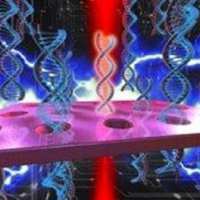 The way molecules and particles present in solutions will interact with surfaces and with each other on the nanoscale will determine key processes such as biological functions, chemical synthesis and corrosion. We study chemical binding and electronic transport using, for example, scanning probe microscopy coupled with electrochemistry.
The way molecules and particles present in solutions will interact with surfaces and with each other on the nanoscale will determine key processes such as biological functions, chemical synthesis and corrosion. We study chemical binding and electronic transport using, for example, scanning probe microscopy coupled with electrochemistry.
By miniaturising liquid channels in nanofluidics, we also study chemical reactions in a very localised space and are able to integrate synthesis with detection in a single chip using nanofluidics. We have also developed new techniques to study single biomolecules in realistic dynamic environments, both experimentally and theoretically.
| Name | Title |
|---|---|
|
Reader in Physical Chemistry, Department of Chemistry - focus on electrochemical processes on the nanoscale Research interests span a range of different areas from single-molecule conductance studies in molecular lectronics to ion and biopolymer transport in small solid-state nanopores |
|
|
Reader in Nanomaterials, Department of Chemistry Specialising in the experimental and theoretical Characterisation of nanoparticles and molecular semiconductors – with particular emphasis on their use in optoelectronic devices. In the area of organic semiconductors, primary on the fa focus is on fabrication, analysis and optimisation of light-emitting diodes and solar cells. |
|
|
Professor in Micro and Nanotechnology, Department of Chemistry Research covers nanobiotechnology with an emphasis on the development of micro and nanofluidic devices for analytical and bio-analytical applications and ultra-high sensitivity optical detection techniques. |
|
|
Reader in Soft Matter, Deparment of Chemical Engineering, focus on polymers and microfluids Research interests are in soft condensed matter, in particular in complex polymer mixtures, multicomponent systems, often containing particles and opolymers. currently studying the thermodynamics and dynamics or polymer blends with a combination of real- and reciprocal-space techniques, including microscopy and AFM, and light, X-ray and neutron scattering. |
|
|
Professor of Theoretical Chemistry, Department of Chemistry Research includes developing new mathematical and computational frameworks that can address the molecular basis (and loss) of biological function at different time and length scales. |
|
| Felice Torrisi |
A Lecturer in 2D materials and Wearable Electronics in the Department of Chemistry and Fellow of Trinity College, Cambridge. Research interests cover printed and flexible electronics graphene and 2D materials, with particular focus on energy, sensing, wearable electronics and bioelectronics. He also works on photonic nanomaterial-polymer composites for Visible, Mid-IR and THz optical modulation and mode-locking. |
Address
Nano @ Imperial
Royal School of Mines
Imperial College London
Exhibition Road
London SW7 2AZ
Email: nano@imperial.ac.uk
